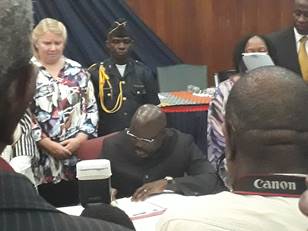Resource information
In a watershed moment for land rights in Liberia and across Africa, President George Weah on Sept. 19 signed into law a land reform bill that extends land rights to millions of rural Liberians.
The Land Rights Act ensures, for the first time, that the land rights of rural Liberians are recognized, protected, and guaranteed by law – an essential ingredient for these communities to achieve secure land rights. Under the previous land tenure system, as much as 80 percent of Liberians lived without legally recognized rights to land.
The Act includes stronger protections for women’s land rights, including provisions for women’s participation on local land management committees. The law also provides spouses with equal rights to be members of land owning communities, an important safeguard for women.


